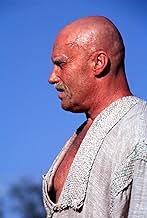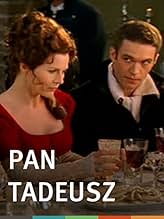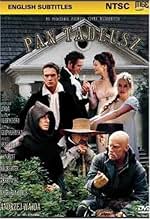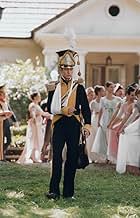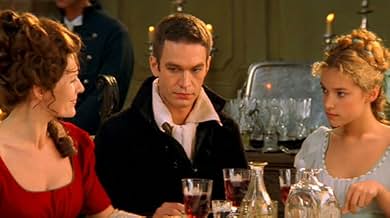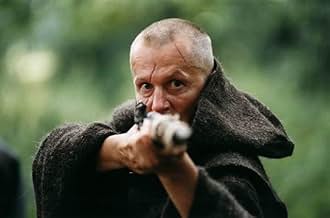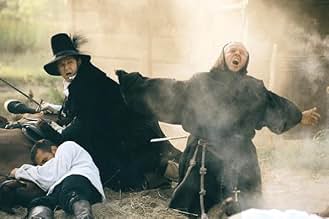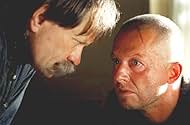In the early 1810s, Poles, part of Russia's client state of Lithuania, think independence will come if they join forces with Napoleon when he invades Russia. This unity of purpose, in one di... Read allIn the early 1810s, Poles, part of Russia's client state of Lithuania, think independence will come if they join forces with Napoleon when he invades Russia. This unity of purpose, in one district, is undermined by two families, feuding since the head of one shot the head of the ... Read allIn the early 1810s, Poles, part of Russia's client state of Lithuania, think independence will come if they join forces with Napoleon when he invades Russia. This unity of purpose, in one district, is undermined by two families, feuding since the head of one shot the head of the other twenty years before. There are hopes of a reconciliation through a marriage of Pan T... Read all
- Awards
- 7 wins & 5 nominations total
- Zosia Horeszkówna
- (as Alicja Bachleda-Curus)
- Rykow
- (as Siergiej Szakurow)
Featured reviews
The goals of watching being purely patriotic, the movie appeared to us as convincing, more to say, interesting from the very beginning. However, the experience of the movie was not merely a patriotic awareness that would truly be applied to a limited number of viewers but something much more, something I would like to share with other people no matter what nationality, upbringing, culture they are - a treasure that seems lost in most modern movies yet found in the great effort to craft cinematic productions based on classical literature. Certainly, it is a serious effort to adapt 1800s' romantic verses to the expectations of modern movie buffs...
"O Lithuania, my country, thou Art
like good health; I never knew till now
How precious, till I lost thee."
(translation by Kenneth R. Mackenzie)
That is how PAN TADEUSZ by Adam Mickiewicz begins, that is how PAN TADEUSZ by Andrzej Wajda ends and what is in between?
A great story of courage, love, sensation, uprising, honor, politics (in the times of Napoleon - a great hope for the partitioned Poland), confession and ... reconciliation: something classical, universal, touching, humane, pure and upright. One could indeed enumerate such adjectives... How does it work in practice? On the one hand, we have a particular focus on national identity and duty while, on the other hand, the emphasis is drawn upon particular characters. To view comes young Tadeusz Soplica (Michal Zebrowski) in love with two female characters: one is Zosia (Alicja Bachleda) – a 14-year-old girl of youthful, innocent joys; the other is Telimena (Grazyna Szapolowska) - a lady of extravagant behavior and tastes of luxury. In between come various characters, including impetuous Gerwazy (Daniel Olbrychski), young count-artist Horeszko (Marek Kondrat), and a humble priest Robak (Boguslaw Linda) who hides his secret till the very last hour of his life ...
The factor that goes with characters and, more specifically, the manner we perceive them is the strongest point of the movie: performances. Although the task to play the roles and say their lines in poem appears to be particularly difficult, most of the cast craft their performances with exceptional flair. It is thanks to them that we all may feel the story go on naturally. Daniel Olbrychski is magnificent as Gerwazy focusing on the aforementioned impetuosity, Boguslaw Linda can be referred to as 'convincing modesty', Ms Szapolowska says her lines with desirable elegance and Michal Zebrowski together with youthful Alicja Bachleda are a fine staff for the couple in love.
Since Mickiewicz payed particular attention to the descriptions of nature, the film does not skip this aspect. It can boast wonderful shots of the green fields, memorable clouds, returning storks, silent forests and beautiful sunsets. Being filmed in an artistic manner, it evokes a unique atmosphere and constitutes a sort of moving painting of idyllic landscapes. The narration by Adam Mickiewicz portrayed by Krzysztof Kolberger adds more importance to it providing the emotions of the author. The brilliant direction by Andrzej Wajda and the musical score by Wojciech Kilar supply a viewer with undeniable experience. Moreover, some scenes remain so intensely in the memory that any sensitive viewer (sensitive to art) will truly be absorbed by watching. Here, I would like to mention famous bear hunting, confession of Jacek Soplica and witty but elegant coffee making sequence. Just a pity there is not a famous mushroom picking tour described widely by Mickiewicz.
If you asked me what this movie means to me, my answer would be simple: an experience for eyes and soul, great cinema which returns after a period of absence, which returns like the upright storks that long for the sublimity of patriot's homeland.
"Pan Tadeusz", the movie, is a costume drama directed by Andrzej Wajda, the Polish director with some notable previous work under his belt. Into this film he brings mainly his experience and routine as filmmaker. The acting, with few exceptions, fails to impress, the actors simply mill around and recite the splendid lines by Mickiewicz. The camera-work is passable, with some nice shots of the beautiful locations. Also scenography and costumes are decent. What stands out is the music by the renowned Wojciech Kilar. But then again, it is standing out against the backdrop of a, frankly, not very exciting movie.
All in all: the most interesting feature of this film is unfortunately lost in translation from rhymed verse in 19th century Polish.
First of all, the screen play was created in a very unusual way. The dialogs were not written, but extracted from the poem, some of them being full rhyming lines and some only parts. Of course most of the meaningful and informative pieces were in the narrative section of the poem and somehow didn't make it to the screen. I'm all for "show not tell", but "don't show, don't tell, everybody knows it all from school" is not the top shelf of movie-making to me.
All that is shown is pretty people, pretty costumes, pretty interiors, pretty nature. Definitely pleasant to see for anyone who likes pictures with historical settings and would like to get to know something about the life in a particular time and place.
The movie really works only for people who have read the poem and have been taught about its historical background. After such preparation they can enjoy this multimedia reconstruction of the characters and places from the book, because that's rather what it is to me. Indeed, all the actors are good, music memorable and all the details nicely done, but this production really lacks the cinematic backbone and something that would allow it to be a movie on its own.
Mickiewicz felt as a real Pole. This film is about the Polish nobilty in Soblicowo how they lead their normal lives - they party, hunt , go mushroom picking and fight with their neigbours. But everyone is waiting for Napolean, the French leader to liberate and save Poland. The director of this movie is famous Polish director. He is found in the imdb with more than 30 films of his career.
One of the most beloved literary works in the history of Polish History, "Pan Tadeusz" was never adapted to the screen before. The cinematography of this film is marvelously done. It demonstrates the beautiful fields of Lithuania, with its natural pictures.
The greatest part of the film was played by Daniel Olbrychski. He showed real emotion and a true actor. He is also a known actor in Europe, starring in films, in Poland, France and Russia.
I encourage everyone to see this film to learn some history and have some fun!
We can expect high popularity level in Lithuania, and, maybe, to some extent in Belarus. But otherwise, the movie will be overlooked and probably discarded by the people who are not familiar with the history of the region, namely, with the Grand Duchy of Lithuania and the union with Recz Pospolita (The Polish-Lithuanian Commonwealth).
For Poles, Lithuanians, Belarusians this is a movie that brings back poignant nostalgia for the glorious past of the Duchy. For everyone else, it is just another historical ballad, based on the classical poem of Adam Mickiewicz.
The director, Andrzej Wajda, did a wonderful job -- the casting seems almost perfect, the whole organization is very nice, the acting is powerful. Some Polish movie critics predict that the film is going to be nominated for Oscar, but as far as it looks now, it is going to be huge -- but only on a regional scale.
Did you know
- TriviaA polonaise composed by Kilar for this soundtrack gained a nation-wide recognition and became the opening tune for most high school proms. Before the movie the first dance was traditionally accompanied by Chopin.
- ConnectionsReferenced in Poranek kojota (2001)
- How long is Pan Tadeusz: The Last Foray in Lithuania?Powered by Alexa
Details
- Release date
- Countries of origin
- Language
- Also known as
- Pan Tadeusz: The Last Foray in Lithuania
- Filming locations
- Oporów, Lódzkie, Poland(castle)
- Production companies
- See more company credits at IMDbPro
Box office
- Budget
- PLN 12,500,000 (estimated)
- Runtime2 hours 27 minutes
- Color
- Sound mix
- Aspect ratio
- 2.35 : 1
Contribute to this page


